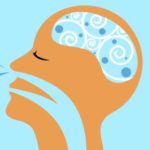Biology and Symptoms
Menopause is a natural process that usually happens between 45 and 55 years old, marking the end of our reproductive years. It is essentially the decline in estrogen and other hormone levels, which means the end of our menstrual cycles. Perimenopause, which comes before menopause, can start as early as our 30s or 40s and is often referred to as the “zone of chaos” due to the fluctuating hormone levels.
During this time, we might experience symptoms like hot flashes, night sweats, irregular periods and sleep disturbances. We may also see an increase in muscular dysfunctions. All these happen as our bodies adjust to lower estrogen levels and it can really affect a woman’s quality of life.
Mental Health
The hormonal changes can also impact our mental health. Anxiety, depression and mood swings might ramp up. Cognitive changes, such as memory and concentration issues are also very common. It’s essential to acknowledge these challenges and seek support, this may look like counselling, support groups or discussions with healthcare providers.
Lifestyle Factors
Maintaining a healthy and active lifestyle can help manage menopause and perimenopause symptoms. Eating a balanced diet that is rich in nutrients and low in processed foods may help manage weight and improve overall health. Regular resistance training is important to maintain muscle mass and bone density and prevent degenerative joint conditions. Good sleep hygiene is crucial too, since hormonal changes can affect our normal sleep patterns.
Exercise isn’t just good for our physical health but also for our mental well-being. Engaging in regular physical activity helps manage stress, reduce anxiety and combat depressive symptoms.
Osteoporosis Prevention
● Engage in weight-bearing exercises.
● Consider hormone replacement therapy (HRT) under the guidance of a healthcare
professional.
HRT can be effective for severe symptoms and can help prevent osteoporosis by supplementing our body’s hormone levels. However, the decision to use HRT should be made in consultation with a healthcare provider, due to individual risks and benefits.
For more information, you can check out the full podcast discussion between Dr. Mary Claire Haver and Andrew Huberman here:





